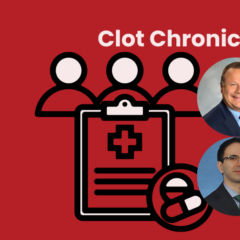Last updated on
Could Venous Thromboembolism Be Chronic?
Recent trial results are changing how doctors think about venous thromboembolism (VTE) and how it should be treated.
“Until recently, it was thought that you need only 3-6 months of anticoagulation if your deep vein thrombosis (DVT) or pulmonary embolism (PE) was provoked. Examples of provoked events would be things like surgery, childbirth, birth control pills, or major trauma,” explained Samuel Z. Goldhaber, MD, President of NATF, Section Head of Vascular Medicine, and Director of the Thrombosis Research Group at Brigham and Women’s Hospital. “However, a major study, called EINSTEIN CHOICE, turned that idea on its head.”
EINSTEIN CHOICE is a multicenter clinical trial that enrolled 3,365 patients who had been diagnosed with venous thromboembolism and had received anticoagulation treatment for six to twelve months. They were then randomized to receive an additional year of therapy with one of three treatment regimens: rivaroxaban 10 mg daily, rivaroxaban 20 mg daily, or low dose aspirin (100 mg daily).
“What we showed was that both doses of rivaroxaban were superior to aspirin in the prevention of the recurrence of VTE,” concluded Jeffrey Weitz, MD, Principal Investigator of the trial. Both doses of rivaroxaban had the same low major bleeding complication rate as aspirin 100 mg daily
What differentiated EINSTEIN CHOICE from other trials was that 60 percent of the patients participating had provoked DVT or provoked PE, while previous trials studied patients with unprovoked DVT or unprovoked PE, where there was no apparent reason for their clotting event. What EINSTEIN CHOICE found was, regardless of whether you had a provoked or unprovoked DVT or PE, rivaroxaban lowered the likelihood of a recurrent DVT or PE when compared to aspirin.
“This is a landmark trial because it used to be thought that there was no point in treating patients with extended duration anticoagulation if they had a provoked DVT or PE, but in this study the majority of patients had provoked DVT or PE,” surmised Dr. Goldhaber.
“The underlying explanation appears to be that DVT and PE are really chronic diseases, like diabetes or coronary artery disease. They don’t really ever go away,” he explained. “This is a major change in thinking as regards to provoked DVT or PE, which used to be thought of as temporary problems that resolve completely with three to six months of anticoagulation.”



